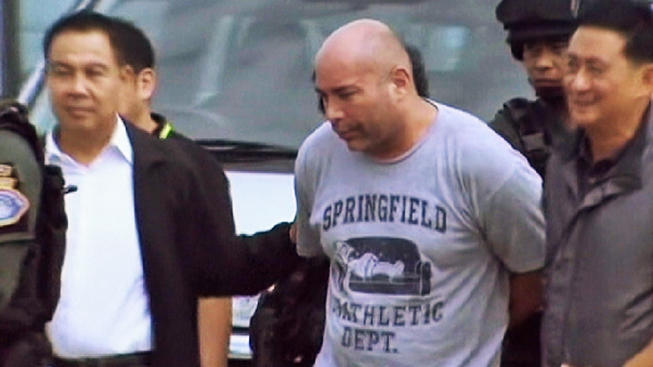 NEW YORK – A U.S. Army soldier plead guilty in Manhattan federal court to charges of conspiring with others to murder a Drug Enforcement Administration agent and a DEA informant, officials announced last week.
NEW YORK – A U.S. Army soldier plead guilty in Manhattan federal court to charges of conspiring with others to murder a Drug Enforcement Administration agent and a DEA informant, officials announced last week.
Forty-nine-year-old Joseph Hunter, “Rambo,” also plead guilty to conspiracy to import cocaine to the U.S., officials said.
Hunter, who was arrested in September 2013 along with co-defendants Timothy Vamvakias, Dennis Gogel, Slawomir Soborski, and Michael Filter after a long DEA undercover investigation, pled guilty Friday before U.S. District Judge Laura Taylor Swain.
“Joseph Hunter has now admitted that he conspired to murder a DEA agent and an informant, and provide security and surveillance for a Colombian cocaine trafficking organization. Hunter, a former U.S. Army officer, became a soldier of misfortune who recruited and led an international band of criminal mercenaries,” Manhattan U.S. Attorney Preet Bharara said. “This global gun for hire will now be confined stateside in federal prison.”
(September 2013 NBC Report)
According to the indictment and other court records, these are some of the facts and circumstances surrounding this case:
- All five defendants previously served in the armed forces of their respective nations.
- Hunter served in the U.S. Army between approximately 1983 and 2004; Vamvakias served in the U.S. Army between approximately 1991 and 2004; Gogel served in the German armed forces until 2010; Filter served in the German armed forces until 2009; and Soborski served in the Polish armed forces until 2011.
- Hunter served as a sniper instructor and a senior drill sergeant, training other soldiers in marksmanship and tactics.
- Vamvakias attained the rank of sergeant and served both as infantryman and a military police officer. Gogel, Soborski, and Filter were also trained as snipers.
Hunter Recruits Co-Defendants to Provide Security for a Colombian Drug Organization
- In 2013, Hunter recruited Vamvakias, Gogel, Soborski, and Filter to serve as security for a Colombian drug trafficking organization and to perform contract killings.
- During meetings in Asia, Africa, and the Caribbean that began in January 2013 and continued through late September 2013, Hunter communicated with three confidential sources working with the DEA, who purported to be Colombian narcotics traffickers.
- Hunter agreed to serve as the head of security for the Informant’s purported narcotics trafficking organization, and assembled a “security team” consisting of Vamvakias, Gogel, Filter, and Soborski.
- Hunter also told the Informants that he had previously been involved in contract killings – referred to as “bonus jobs” – and that some team members wanted to do as much “bonus work” as possible.
- Hunter and his co-defendants thereafter agreed, in meetings and communications with the Informants to provide security and surveillance services to the narcotics trafficking organization.
- In late March 2013, in Thailand, Gogel, Filter, and Soborski surveilled a vessel on behalf of the Informants’ purported narcotics trafficking organization and reported their activities to Hunter.
- In April 2013, in Mauritius, at the direction of the Informants, Gogel, Filter, and Soborski provided security for a meeting at which the participants discussed the distribution of illegal narcotics to the United States.
- In late June 2013, Vamvakias, Gogel, Filter, and Soborski conducted surveillance of a purported U.S.-registered aircraft at the direction of Informant-3, who posed as a member of the narcotics trafficking organization.
- Informant-3 told the defendants that the aircraft was to be loaded with 660 pounds of cocaine to be shipped to New York.
- The security team reported their activities to Hunter.
- Furthermore, Hunter, Vamvakias, and Gogel agreed to commit murder-for-hire in Liberia by assassinating both a Special Agent of the DEA and a person who, according to the informants, was providing information to the DEA about the narcotics trafficking organization.
In Exchange for the Murders, Defendants Would be Paid $800,000
In exchange for the murders, Vamvakias and Gogel were together to be paid approximately $700,000, and Hunter was to receive an additional $100,000 for supervising the hit team.
Communications between the defendants and the confidential informants occurred by telephone, over e-mail, and in a series of surreptitiously audio-recorded and videotaped meetings over an approximately nine-month period.
In mid-May 2013, at a meeting with the informants in Thailand, Hunter, Vamvakias, Gogel, and Soborski were told that a “bonus job” – that is, a contract killing – was in the offing, due to a leak within the informants’ narcotics trafficking organization.
In late May 2013, in email communications, Hunter confirmed that his team would be willing to murder both a U.S. law enforcement agent and a source (a boat captain), who was purportedly providing information to U.S. law enforcement authorities about the narcotics trafficking organization.
Hunter confirmed by email that his team would kill both the DEA agent and the informant.
Details on Contract Killings
At a meeting in late June 2013, Informant-3 explained to Vamvakias and Gogel that “the job is to kill a U.S. DEA agent and a source with the DEA,” who would be located in Liberia.
Vamvakias and Gogel discussed the weapons that could be used and masks to be worn for the murders, and Vamvakias stated that it would be better to “hit the agent first” and then “the snitch.”
In early July 2013, Hunter sent via e-mail a list of the items needed for the murders, including “[t]wo Submachine Guns with silencers . . . [t]wo .22 pistols with Silencers.”
In mid-August 2013, at a meeting in Thailand, Hunter, Vamvakis, and Gogel discussed in detail the weapons that would be used and the possibility of entering Liberia without having their passports stamped.
They suggested that Informant-3 fly them out of the country via private plane following the murders. Vamvakias stated that among other weapons, a sub-machine gun and two .22 caliber pistols would be needed for the murders, and Informant-3 agreed to deliver the weapons to Liberia.
The next day, at a meeting with Gogel, Informant-3 confirmed that an order for the requested weapons had been made. Later that same day, Gogel met again with Informant-3 and provided Informant-3 with two highly sophisticated latex face masks, which can make the wearer appear to be of another race, for Informant-3 to transport to Liberia.
In late September 2013, Vamvakias and Gogel arrived in Liberia to commit the planned murders-for-hire.
Charges and Sentencing Dates
Hunter plead guilty to one count of conspiring to import cocaine, one count of conspiring to murder a federal law enforcement agent and a person assisting a federal law enforcement agent, and one count of conspiring to possess a firearm in furtherance of a crime of violence.
As a result of his guilty pleas, Hunter faces a sentence of 10 years to life, officials said.
Hunter is scheduled to be sentenced by Judge Swain on May 29.
Vamvakias, 43, pleaded guilty to Counts One, Two, Four, and Five of the indictment on January 9. He is scheduled to be sentenced on April 30.
Gogel, 29, plead guilty to several counts in the indictment and will be sentenced on May 1.
Soborski, 41, pleaded guilty to Count One of the Indictment on February 10, 2015, and is scheduled to be sentenced by Judge Swain on May, 29, 2015.
The remaining defendant, Filter, 30, is charged with conspiracy to import cocaine into the United States. He will go on trial in March.
Filter is presumed innocent until proven guilty.

